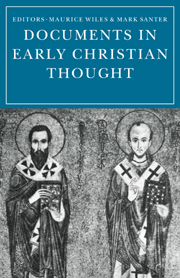3 - CHRIST
Published online by Cambridge University Press: 17 August 2009
Summary
The affirmation of the divinity of Christ raises questions not only about the nature of the godhead of the kind dealt with in the last section, which led to the development of the doctrine of the Trinity. It raised questions also about the person of Christ himself – how could he be both God and man? The first extract comes from an attack by Tertullian on the teachings of Praxeas written about a.d. 210. Praxeas is probably a nickname meaning ‘busybody’. The distinctive feature of his teaching (not unlike what Origen appears to have objected to in Heraclides) was so strong an insistence on the unity of God that he was led to regard Father and Son as different names for God rather than indicative of different persons. This is the main problem dealt with by Tertullian in the work, but in the section given here he goes on to insist that Christ must be seen as both God and man without any diminution or loss of the essential characteristics of either nature.
The next five extracts come from the Eastern Church which was the scene of the main struggle to understand the full implications of the Church's confession on this issue. The first of them comes from a work of Eusebius of Caesarea, almost certainly written before the outbreak of the Arian controversy.
- Type
- Chapter
- Information
- Documents in Early Christian Thought , pp. 43 - 75Publisher: Cambridge University PressPrint publication year: 1975



